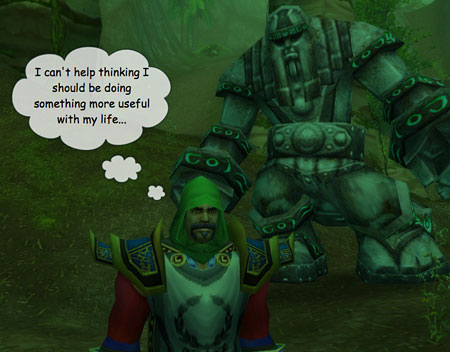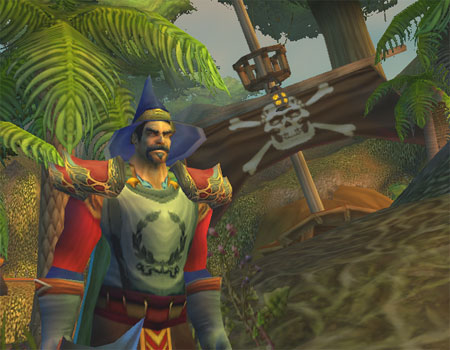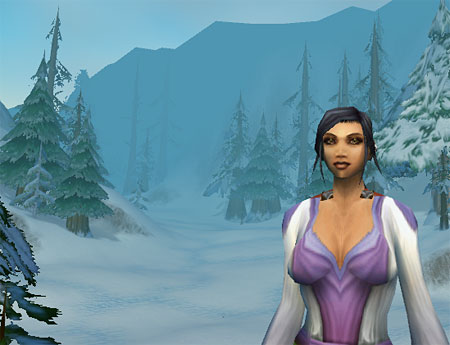Last Friday – around ten in the evening – Pentheus, my main character in World of Warcraft, hit level sixty. Thinking back, I’m now not entirely sure where he was when this happened, although I believe it was in the wastes of Silithus. I waited until I’d got to the Altar of Storms to start my quests for my Dreadsteed before I took the above picture.
I honestly don’t know how I feel about the whole thing. It was – frankly – sort of an anti-climax. Nothing happened, I just remained being level sixty. There was no sense of a threshold being reached. My character – the same character I’ve been playing on and off since November – was just slightly more powerful than he was before. And a whole range of long extended new quests wandered off before him. There would be no new spells, no new pets, no real development – except in sets of armour and property. Each quest, each raid will now be longer and more involved than they were before – a dungeon taking two or three evenings to explore properly and requiring a group of people to play with that I’ve struggled to collect along the way. The whole game now feels very laborious and slow – the simple pleasures of earlier in the game, where you were picking up new abilities and developing quickly have just disappeared, to be replaced with something more drudgelike, robotic and … as the people in game describe it … grinding.
Now the interesting thing about this is you’d think that was a very good reason to stop playing the game immediately – but somehow no. My relationship with World of Warcraft is a lot more complicated than that – so complicated that it’s forced me to reconsider a lot of my assumptions about gaming. These assumptions have been further challenged by reading Raph Koster’s book and weblog, A Theory of Fun for Game Design. The two experiences – reading and playing – have not pushed in the same direction however – they’ve not led me to the same conclusions – and this has resulted in me spending a lot of time wondering about the relationship between entertainment and productivity, fun and work, drudgery and compulsion. I’ve started wondering whether a game could still be considered good if you want to play it a lot but at the same time resent the time that it takes from you. What if you find it boring but still somehow can’t put it down. Can you love and hate a game at the same time and still call it ‘fun’? Can a game be a narcotic, or a guilty secret or an addiction? Can it be a fruitless activity without value that still feels good
Raph’s book includes a really interesting analysis on what games are, and what fun is and is not which is far too long to quote in full here, but which includes this summary:
Games aren’t stories. Games aren’t about beauty or delight. Games aren’t about jockeying for social status. They stand, in their own right, as something incredibly valuable. Fun is about learning in a context where there is no pressure, and that is why games matter.
This sort of fascinates me because it contains a weird twist of logic – that fun is learning without pressure, and that therefore games matter – presumably because learning is de facto a good thing. But what if you’re learning a system or a landscape with no transferable value – what if a specific game presents you with a structure designed to purely generate the sensation of perpetual fun by short-circuiting the learning impulse and misdirecting it into valueless territories? There would be a memetic advantage in being a game that could be intoxicating in that way without requiring that people learn skills that were transferable elsewhere. For a start, real-world skills are harder to develop and perhaps less short-term satisfying. Secondly, a process that teaches you real-world skills would result in you evolving and changing. A game that could short-circuit your learning instinct wouldn’t have to do that. There would be no reason for you to leave.
There’s another quote in Raph’s book which is about what happens when you get older and why people stop playing games. He says, “We don’t actually put away the notion of ‘having fun’ as far as I can tell. We migrate it into other contexts. Many claim that work is fun, for example (me included). Just getting together with friends can be enough to give us the little burst of endophins we crave.”
I think this is really interesting, because it hits on a few more weird contradictions – working can be a learning exercise, it’s true, but there’s normally some risk involved. if you do bad things in a job, you can be fired. There are consequences. So that seems rather at odds with his earlier sense of fun. And a work environment has no formal ruleset, has no structure that you’d recognise as game-like. And of course it can have real-world rewards. If work can be fun, then I’d argue that’s not because it’s like games – an environment in which you can learnwithout risk, but precisely because it’s not like games, the productive element generates a satisfaction that is totally missing in World of Warcraft. The creative and generative element is also absent. Perhaps the reason we think of games as a childish activity is because play in our youth is supposed to inform work in our adulthood. Perhaps then, a game that feeds on our desire to learn and our childlike instincts but cannot give us the satisfactions of creation or real dangers, is a con, a short-cut, a parasite. Perhaps adult gaming is nothing more than an opiate, designed to provide satisfactions and a sense of development or progress that the real world is unable to provide for most people, or that people are too nervous to fight for.
Apparently you can get a character on World of Warcraft to level sixty in about three months of consistent after-work play. Personally, my experience has taken me three times that length of time, and has been squeezed around long hours on work projects and more travelling than I’ve ever done before. Given that it hasn’t massively compromised these parts of my life, I’m guessing that the level of compulsion I’ve felt to play has not been massively excessive – but it’s still felt like a time sink that somehow claims me for my out of work creative time. That really worries me.
Let me put it this way – while I feel no massive compromise to my life is occurring now, while my relationship with the game is merely grudging at the moment, I can imagine coming to hate the game and yet still wanting to play it. Is that an extraordinary statement? Is that a piece of self-insight there, or is it something about the game? I can’t tell where the fault lies if there is a fault? Can you build something that is too addictive simply in the way it presents challenges and rewards, to the extent that it becomes psychologically addictive. Can something with no pharmaceutical components be a drug? Or is this simply a matter of self-discipline and self-control? How tempting does an alternative world filled with mechanisms for alleviating status anxiety have to be before the space between fun and craving gets crossed? Is television any different? Am I just coming to some weird form of Protestant neurosis in my mid-thirties?
One of my older posts is currently full of people talking about their problems with World of Warcraft in particular – wives saying that her husband ignores his children to play, men who say they would rather play WOW than have sex with their wives, teenagers who say that they’re failing school so they can play, and it’s led me to this weird point. Are they all making excuses? Is the game a scapegoat? Are they weak-willed and to be pitied? Or are we as a culture starting to construct toys that are too effective and end up hurting people? I know it sounds alarmist, but I really want people’s opinions. What do you think?





